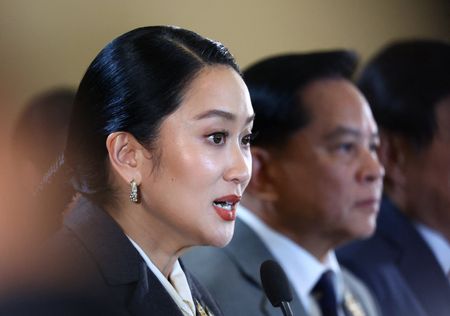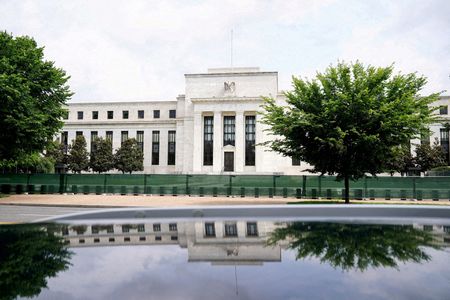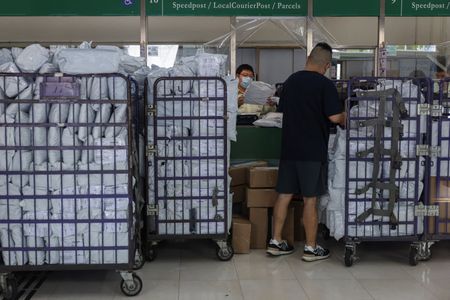SINGAPORE (Reuters) -Thailand’s Constitutional Court dismissed Prime Minister Paetongtarn Shinawatra from office on Friday for an ethics violation after only a year in power, catapulting the Southeast Asian country into a new period of turmoil and uncertainty.
Thailand’s SET index has lost more than 11% this year, making it the worst performing stock market in Asia. It was last down 1% on Friday while the Thai Baht was slightly weaker after the ruling.
Here are comments from analysts and investors:
ERICA TAY, ECONOMIST, MAYBANK INVESTMENT BANKING GROUP, SINGAPORE:
“With political leadership in a flux, efforts to stimulate the economy in the near term and enact reforms in the medium term will face obstacles.
“A bright spot for the Thai economy since Q2 has been the relocation of supply chains from China. But the recent flurry of fixed investments into emerging industries may slow down, if investors become concerned about policy continuity.”
GARY TAN, PORTFOLIO MANAGER, ALLSPRING GLOBAL INVESTMENTS, SINGAPORE:
“The dismissal was widely anticipated by the market and underscores the persistent political fragility that has affected Thailand for years. With growth stuck near 2 percent and structural headwinds in exports and demographics, this latest episode gives global investors, who have largely ignored the market, yet another reason to stay on the sidelines.”
CLIFFORD LAU, HARD-AND-LOCAL CURRENCY PORTFOLIO MANAGER AT WILLIAM BLAIR INVESTMENT MANAGEMENT, SINGAPORE:
“Over the years, we have seen so many similar episodes like this one in Thailand where politicians come and go. It is nevertheless inconvenient and caused unnecessary distractions to the government where, in our opinion, they should be focusing on addressing lingering economic issues of weak growth, falling tourist arrivals and private consumption.”
MOHIT MIRPURI, FUND MANAGER, SGMC CAPITAL, SINGAPORE:
“Markets have taken the court’s decision in stride for now, reflecting how political noise is already factored into Thailand’s risk premium. Investors are more focused on external headwinds such as tariffs, slowing growth and weak investment appetite, which weigh more heavily on the 2H outlook.
“Near-term, stability will matter more than personalities, but Thailand still faces the tougher task of restoring export competitiveness and investor confidence.”
KASEM PRUNRATANAMALA, HEAD OF THAILAND RESEARCH, CGS INTERNATIONAL, BANGKOK:
“I think most people didn’t expect the prime minister to survive this case, so I think it’s not a shock to the market nor the economy. And I think the parliament will vote in a new prime minister early next week. We believe that the Pheu Thai party will try to maintain support from the coalition partners, so the same coalition partners are still likely to form the new government. So in that case, there wouldn’t be a massive disruption in terms of policies, unless the coalition parties cannot form a new government.”
RAKPONG CHAISUPARAKUL, SENIOR VICE PRESIDENT OF INVESTMENT STRATEGY, KGI SECURITIES, BANGKOK:
“Our preliminary assessment is that there could be a short-term negative impact on market sentiment because now it’s still quite uncertain how the politicians will choose the new prime minister.”
TRINH NGUYEN, SENIOR ECONOMIST FOR EMERGING ASIA, NATIXIS, HONG KONG:
“It is already priced in that Thailand will face slow growth and political instability so this is not fresh news. The BOT (Bank of Thailand) is likely to cut rates on the back of weak growth and unstable politics. ”
(Reporting by Ankur Banerjee and Rae Wee in Singapore, Nikhil Sharma in Bengaluru, Editing by Raju Gopalakrishnan)










